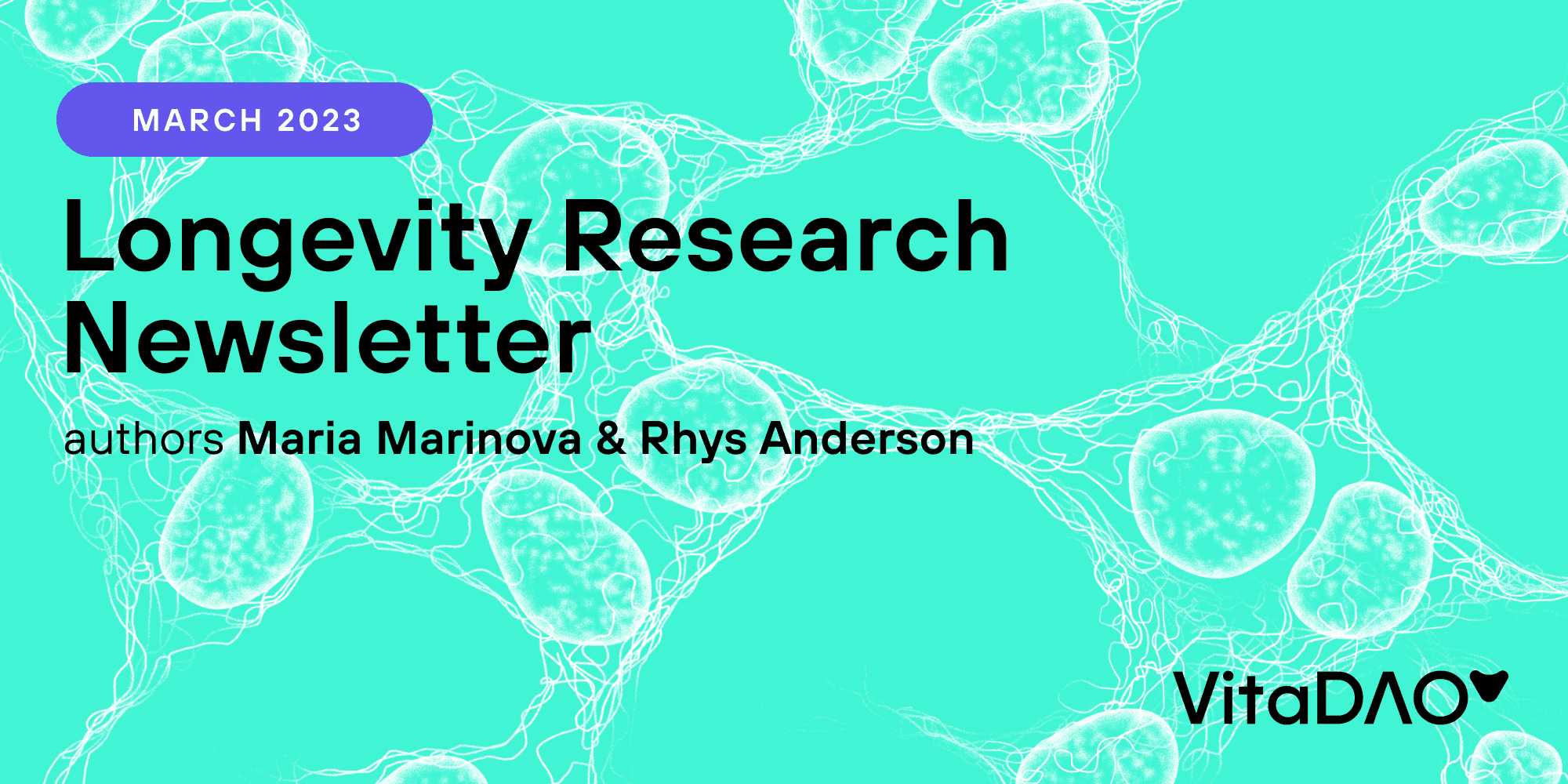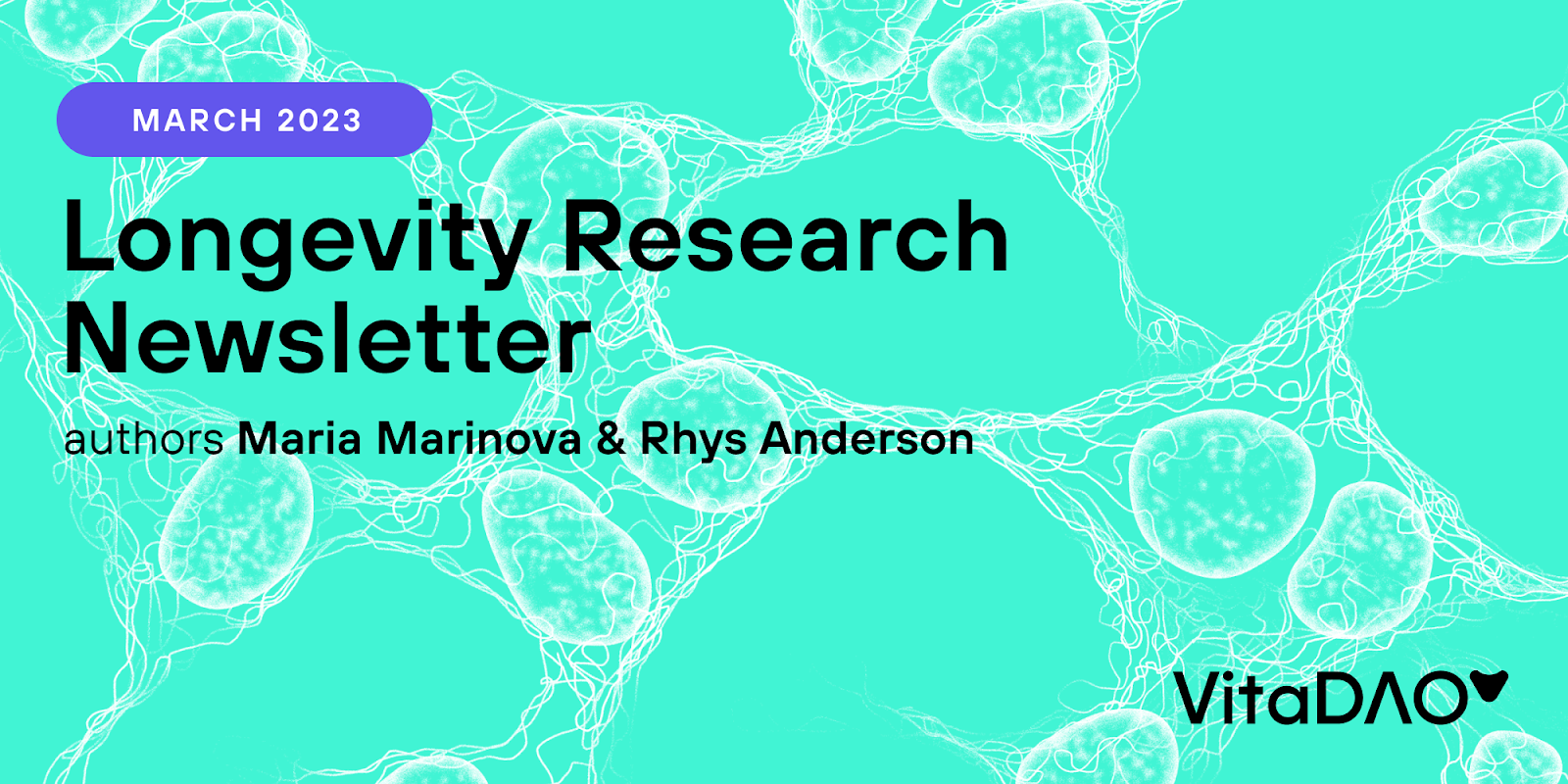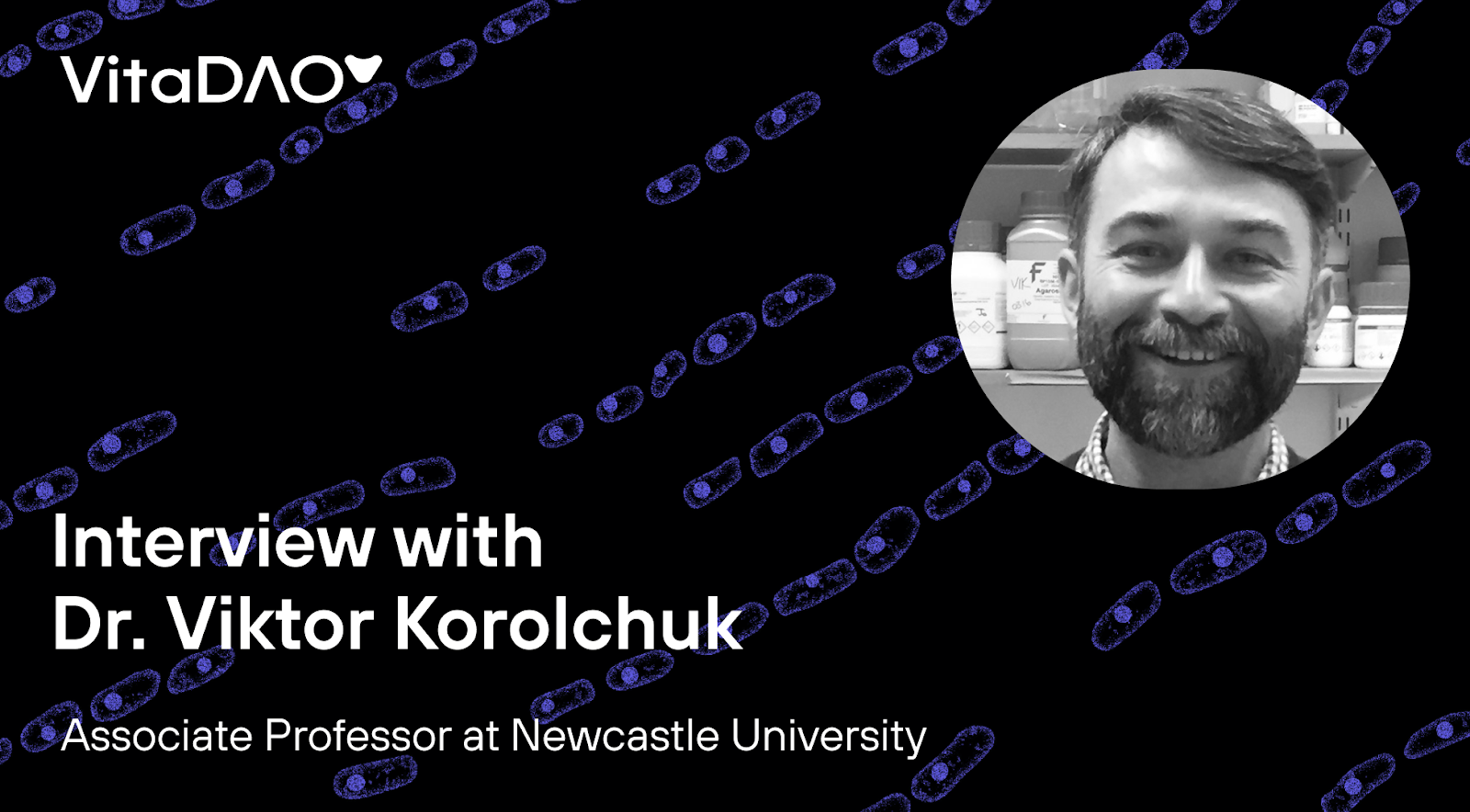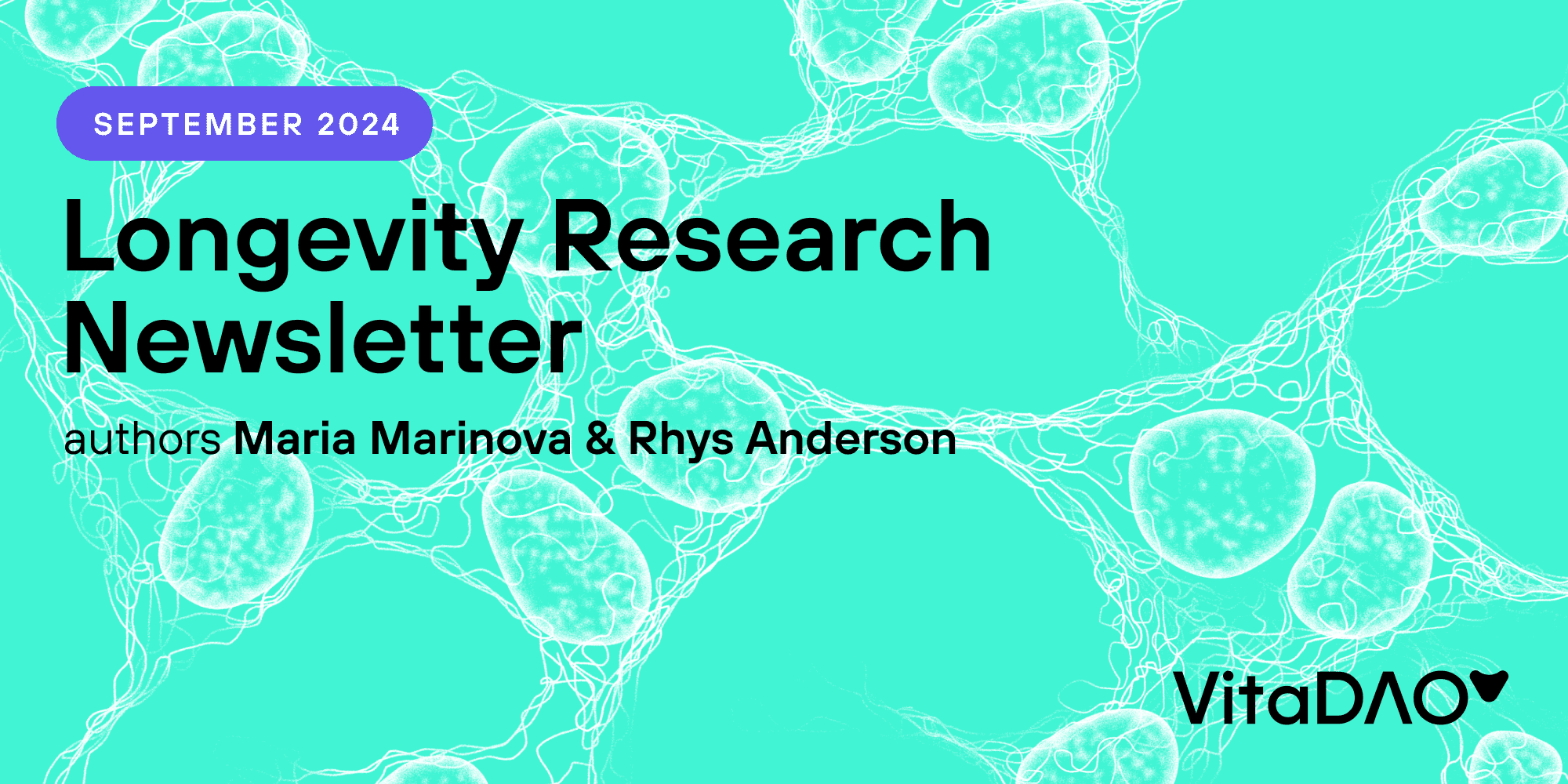
March Longevity Research Newsletter

March Longevity Research Newsletter

Introduction
Welcome back Vitalians!
In recent years, autophagy has emerged as an important topic in the field of aging biology and is now considered a major Hallmark of Aging.
Autophagy is a fundamental process that plays a critical role in the maintenance of cellular homeostasis. This process is involved in the degradation and recycling of cellular components, including damaged organelles, misfolded proteins, and intracellular pathogens.
Autophagy has been shown to become dysregulated with age, contributing to the aging process by impairing cellular homeostasis and increasing cellular damage. This is thought to play a role in the pathogenesis of several diseases, including cancer, neurodegeneration, and metabolic disorders.
Understanding the role of autophagy in aging biology has important implications for the development of interventions to promote healthy aging. By enhancing autophagy, it may be possible to improve cellular function and delay the onset of age-related diseases. This has led to growing interest in the development of drugs and other interventions that target autophagy as a means of promoting healthy aging.
VitaDAO are supporting autophagy research in several ways, including funding Dr. Viktor Korolchuk's lab to pursue the discovery of novel autophagy activating drugs. We had the pleasure of interviewing Dr. Korolchuk for this month’s newsletter - so don’t miss this insightful interview which touches on autophagy drug development potential, new theories of aging and the state of the longevity field.
Longevity Literature Hot Picks
Preprint Corner
This month we are featuring 7 new preprints which are all available to review on our reviewing platform The Longevity Decentralised Review (TLDR) in return for a bounty of 50 $VITA each. Simply follow the above link to the TLDR page and get reviewing! What's more, we will be continuing the 50 $VITA bounty for reviewing any of the preprints featured in our January and February research newsletters.
Multidimensional proteomics identifies molecular trajectories of cellular aging and rejuvenation
Modelling the dynamics of senescence spread
The intensities of canonical senescence biomarkers integrate the duration of cell-cycle withdrawal
Mitochondrial haplotype and mito-nuclear matching drive somatic mutation and selection through aging
Heterogeneous aging across multiple organ systems and prediction of chronic disease and mortality
Mitochondrial H2O2 release does not directly cause genomic DNA damage
Published Research Papers
The DREAM complex functions as conserved master regulator of somatic DNA-repair capacities
Björn Schumacher’s team have discovered the first master regulator of somatic DNA repair capacities - The DREAM complex. This complex transcriptionally represses essentially all DNA-repair systems and inhibiting this can lead to improved DNA damage repair and resistance to various types of genotoxic insults.
Centenarian clocks: epigenetic clocks for validating claims of exceptional longevity
Horvath’s team develops a centenarian epigenetic clock to validate claims around exceptionally old age based on samples from centenarians, semi-supercentenarians (aged 105 +), and supercentenarians (+110, the oldest person being 115).
TFEB-ependent lysosome biogenesis is required for senescence
Cellular senescence is associated with dysfunctional lysosomes which the cell compensates for by undergoing lysosomal biogenesis. Here the Carroll lab show that upon senescence induction TFEB accumulates in the nucleus and regulates lysosomal biogenesis. Furthermore, inhibiting this process results in the premature death of senescent cells due to diminished degradative ability as a result of impaired lysosomes and inability to produce more to compensate.
Senescence markers are high in middle aged and older overweight adults than young sedentary people, but this was significantly reduced in aged matched runners suggesting that high volume high intensity endurance exercise prevents senescent cell accumulation. The resulting decrease in senescence associated inflammation is especially important in cancer prone tissues such as the colon mucosa.
Aging disrupts MANF-mediated immune modulation during skeletal muscle regeneration
Skeletal muscle regeneration is disrupted with age. An immune modulator MANF is responsible for muscle injury repair in young animals but is not induced in old ones, thus impairing regeneration. Restoring MANF levels could be a viable strategy to preserve skeletal muscle regenerative function with age.
The Miller lab previously published that genetic mouse models of slow ageing show similar changes in a number of pathways. They now observe similar changes with 4 lifespan-extending drugs and calorie restriction. Changes include an increase in anti-inflammatory macrophages and decrease in inflammatory macrophages, and differential expression of numerous proteins involved in age-related diseases such neurodegenerative, metabolic and inflammatory diseases.
Single cell transcriptomic profiling was employed to measure changes in young and old mice brains after parabiosis. Analysis showed that multiple hallmarks of aging in the brain were regulated by heterochronic parabiosis in a cell type specific manner.
Habitual daily intake of a sweet and fatty snack modulates reward processing in humans
Continued consumption of high fat, high sugar snacks in normal weight individuals resulted in decreased desire for low fat, low sugar food. The changes were independent of body weight and metabolic alterations.
The Mother's Curse hypothesis suggests that as mitochondria are maternally inherited, there is no selective pressure to remove mitochondrial genome mutations which are exclusively deleterious to males. Here the authors study over a hundred mammal population across 104 species and concludes that Mother's Curse hypothesis doesn't affect mammalian ageing rated between male and females
Published Literature Reviews
The autophagy–NAD axis in longevity and disease
Ageing as a software design flaw
Impact of Cellular Senescence on Cellular Clocks
BCL-2 proteins in senescence: beyond a simple target for senolysis?
Cholesterol drives inflammatory senescence
Cellular Senescence: beneficial, harmful and highly complex
AI Technology for Anti-Aging: an Overview
Job board
Joe Nassour is joining the University of Colorado as an Assistant Professor in summer 2023! His lab will study how telomeres interact with autophagy and innate immunity to prevent cancer initiation. Reach out to him to explore opportunities to join his team!
Research Lab Technician II (Mouse) - Benayoun lab/USC
The Benayoun Lab is seeking a mouse research lab tech II to join the team to help them understand sex differences in aging at USC in southern CA!
Marco Demaria’s lab, working on aging and cellular senescence, has an available postdoc position. ERIBA - European Research Institute for the Biology of Ageing UMCG research
BioAge is hiring a talented Senior Data Scientist and a Research Associated! BioAge’s mission is to deeply analyse human longevity data to discover drug targets for diseases of aging
News
First longevity clinical study design fetches FDA approval
Sam Altman invested $180 million into a company trying to delay death
Regenerative cell biotech Thymmune launches with backing from George Church, John Maraganore
NVIDIA Unveils Large Language Models And Generative AI Service To Advance Life Sciences R&D
Resources
Spannr 2022 Longevity Funding Report
Open Problems in Longevity Science
An online comprehensive compilation of open problems in longevity science for creating a coordinated scientific effort for finding cures for aging. Created by João Pedro de Magalhães, Hamid Hossein Alfatemi and Angelo Talay.
Articles
A ridiculously fluffy rodent may hold the secret to longevity
Who wants to live for ever? Quite a lot of people
Ants Live 10 Times Longer by Altering Their Insulin Responses
Want to live to 150? The world needs more humans.
If they could turn back time: how tech billionaires are trying to reverse the ageing process
Retro: A longevity biotech triple-threat?
Fetal exposure to Great Depression economic hardship linked to accelerated aging
Ageing is a disease, and Christian Angermayer is here to cure it
Loyal’s latest milestone: the first longevity clinical study design supported by the FDA
Removing Senescent Cells May Slow, Halt, or Reverse Diseases of Aging
Four 80-year-old men finished a 100-mile race. Here’s how they did it
Everything Wrong with Mouse Studies (Kinda)
Conferences, Workshops and Webinars
Longevity Med Summit - Lisbon
4-5th May, 2023 in Lisbon, Portugal.
The main goal of Longevity Med Summit is to provide and share knowledge to the medical community aimed at helping patients live longer and delay age-related health issues.
5th World Aging And Rejuvenation Conference
July 17-18, 2023 in Frankfurt, Germany.
Meet the most inspiring speakers and experts gathering to discuss their present research.
Pop-up city - Zuzalu
Longevity Events in May
May 6-9th: Longevity 0-1
May 13-14th: Longevity Industry Talks
Podcasts and Videos
Life Blood: Live Better and Longer with Dr. Charles Brenner
LifeBlood: We talked about how to live better and longer, what NAD is and how it impacts metabolism, how to become more physically resilient, and how to restore damaged cells, with Dr. Charles Brenner, Chief Scientific Advisor at ChromaDex, researcher and healthy aging advocate.
Interviewing Dr. Peter Attia — The Science and Art of Longevity, Optimizing Protein, Alcohol Rules, Lessons from Glucose Monitoring with CGMs, Boosting Your VO2 Max, Preventing Alzheimer’s Disease, Early Cancer Detection, How to Use DEXA Scans, Nature’s Longevity Drug, and More (#661)
Interview with Prof Viktor Korolchuk
An Associate Professor at Newcastle University, UK, Dr. Viktor Korolchuk received his PhD from the Institute of Biochemistry, National Academy of Sciences, Ukraine, and conducted postdoctoral research at the University of Cambridge, UK. Dr. Korolchuk's laboratory is presently dedicated to investigating the molecular mechanisms of ageing with the aim of discovering interventions that could potentially promote cellular rejuvenation and extend the healthy human lifespan. VitaDAO is proud to support his project on autophagy activators.

What inspired you to enter longevity research?
When choosing the directions for my independent research over ten years ago I considered the biggest remaining questions and challenges in the field of life sciences. Upon extensive reflection I decided that philosophically there is no other problem as important as ageing. Being able to contribute to our understanding of this process, to delay or prevent it all together, would have the greatest impact on human life, society, and the world as we know it. This was the reason for applying for an academic position at the first and most established Ageing research centre in the UK based at Newcastle University.
Which of the current theories of ageing do you think are the most convincing?
There are a lot of interesting developments in this area. Some are based on the idea of ageing as a programmatic process, e.g. a software design flaw by Joao Pedro de Magalhães (doi: 10.1186/s13059-023-02888-y) or a selective destruction concept by my colleague and friend James Wordsworth (e.g. doi: 10.1016/j.mad.2022.111709). Both could also potentially explain metabolic slowdown with ageing. We see experimental evidence of this age-associated sluggishness at every level of biological complexity, from individual cells isolated from aged human donors to whole organisms. Trying to explain the reasons and significance of these changes is very important but we also should consider that cellular metabolism could in turn affect the gene expression and the ageing clocks. This is where autophagy could also play the role and our working hypothesis that activating autophagy could restart metabolism and may even slow down the ticking of the clock.
However I think that neither programmatic or damage accumulation-based theories alone would be completely sufficient to explain why we become old and die. The obvious truth is that this is a very complex process and will probably require a theory that would integrate multiple mechanisms rather than attempting to use a reductionist approach. Developing a convincing theory is extremely important as it would lay the ground for probably equally complex anti-ageing interventions.
How has the field changed since you started?
Biogerontology is no longer a fringe science. With the increased awareness of the socioeconomic and healthcare problems associated with ageing it became a mainstream field. Ageing research centres sprung around the world and a lot of funding has been channelled into this area. There is excitement for the future at the moment and one can only hope that this trend will continue for the years to come.
What mistakes do you think the longevity field has made?
Working in silos, using the same reductionist approaches that work so well for simpler biological problems, forming and maintaining tribes which protect own ideas/theories. These are common problems in any area of biomedical sciences but particularly damaging for biogerontology which should ultimately explain and cure ageing, the most complex biological process of all.
Other than your own, what do you think have been the biggest/important discoveries in the field?
The first example that comes to mind is cellular senescence, which was previously seen as no more than a curious artefact in a petri dish. Now senescence is recognised as an important driver of ageing and a target for rejuvenation therapies. The idea of rejuvenation by reprogramming has also taken off, although a lot of practical hurdles remain to be solved before we would be able to capitalise on its potential. However, the most dramatic development for me was the rise of longevity biotech, which was brought by the realisation (or a mere hope, time will tell) that ageing is a malleable process and that even the smallest advances in this area could bring a huge benefit for humankind.
What advice would you give to people currently working in longevity research?
Learn everything that we know about human biology, think outside the box, keep an open mind and challenge any established preconceptions.
Which aspect of longevity research do you think requires more attention?
Fundamental studies of biological processes underlying ageing, particularly using human-centric models. Only when we understand why we become old will be able to do something about it.
Is ageing a disease?
If we are ever able to delay or cure human ageing, it will become a disease from the past for generations to come.
How do caloric restriction and intermittent fasting affect cellular autophagy in vivo? Do we have evidence of this process in humans and are benefits evident?
Most of our evidence is based on experiments using animal models. We are still far away from being able to monitor autophagy and its benefits in a living human, particularly in tissues that are not easily accessible for testing. Detrimental effect of impaired autophagy on human health is very clear (e.g. caused by mutations in autophagy-related genes), but the benefit of autophagy upregulation is largely an assumption. This being said, autophagy is probably one of the most promising target for interventions considering its homeostatic and metabolic functions.
What disease indications would autophagy enhancers impact the most? For example if your VitaDAO funded project for discovering novel autophagy activators was successful, what disease model would you use to validate it first?
The choice of initial disease indication is purely practical, based on the cost and the time required to demonstrate safety and efficacy. Rare monogenic diseases such as lysosomal storage disorders could be one potential application as these are associated with an accumulation of damaged cellular components. Activation of autophagy could be beneficial in this situation, and we see evidence of this in neuronal models of these diseases. A range of other age-related diseases could also be targeted depending on the type of pathology and drug pharmacokinetics.
Do you see autophagy activation as a longevity treatment? Is there evidence it helps healthy aging adults (i.e. in the absence of disease), reduces disease risk or lowers any biological age clocks/biomarkers?
It is certainly our hope that autophagy activators will be a part of anti-ageing strategies. As mentioned above, this is largely based on laboratory models where genetic or pharmacological (e.g. spermidine) interventions activating autophagy increase lifespan. There is also ample evidence for anti-ageing (as for example estimated using epigenetic clocks) effects of rapamycin which among other things activates autophagy. It is still early days for human trials of autophagy activators, for example rilmenidine has recently been found to be safe to use in patients with age-related neurodegenerative disease but larger scale randomised controlled trials are now needed. Before we could go into healthy people, we need specific and safe small molecules, which is what we and others are working on.
Tell us about your latest paper on the relationship between NAD+ metabolism and autophagy. What is the key take-away?
The paper is based on over seven years of our effort trying to understand the connection between autophagy and NAD. The key message is that when autophagy (or mitophagy) fails NAD levels also plummet down, which is not a good thing if you want to stay alive. The implications are not only for those specific pathological states where autophagy is impaired, but also for ageing in general. Autophagy is believed to go down with age and according to our model it would also bring down NAD levels thus resulting in a metabolic decline.
Outro
Thank you for staying with us till the very end and as always we encourage you to reach out to us about content you’d like us to discuss in our next issues. See you next month!
Further Reading
Acute Effects of Coffee Consumption on Health among Ambulatory Adults
The Timing Sequence and Mechanism of Aging in Endocrine Organs


